Martin Kok: Gangland figure jailed for murder of Dutch writer
- Published
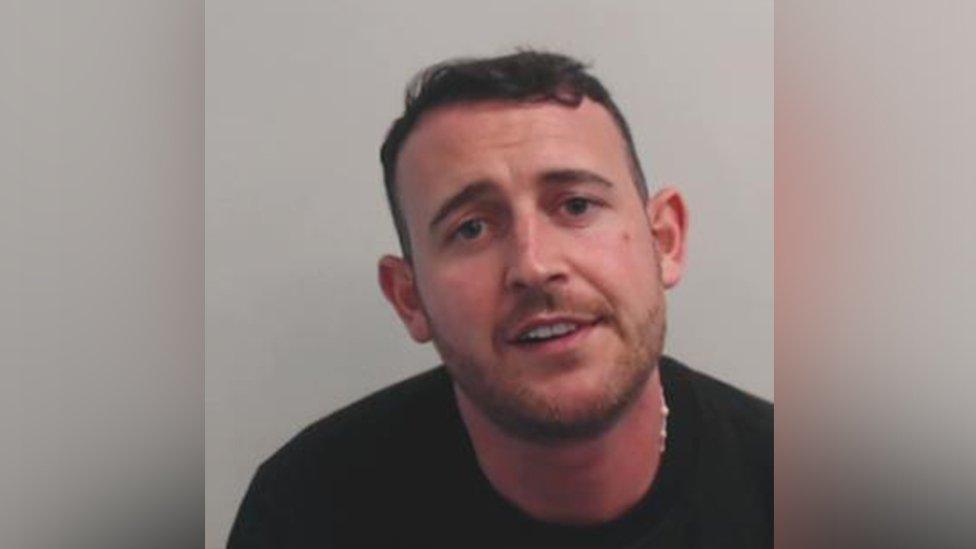
Police described Christopher Hughes as a "dangerous individual".
A member of a major Scottish crime gang has been jailed for at least 25 years for the murder of a Dutch crime writer outside a sex club.
Christopher Hughes lured Martin Kok, 49, to his death before he was shot eight times by a gunman in Laren, in the Netherlands, on 8 December 2016.
Police described Hughes, 33, as a "dangerous individual" after he was convicted last month.
He was part of a global enterprise that generated more than £100m a year.
Hughes, originally from Glasgow, was also found guilty of involvement in serious organised crime between July 2013 and January 2020.
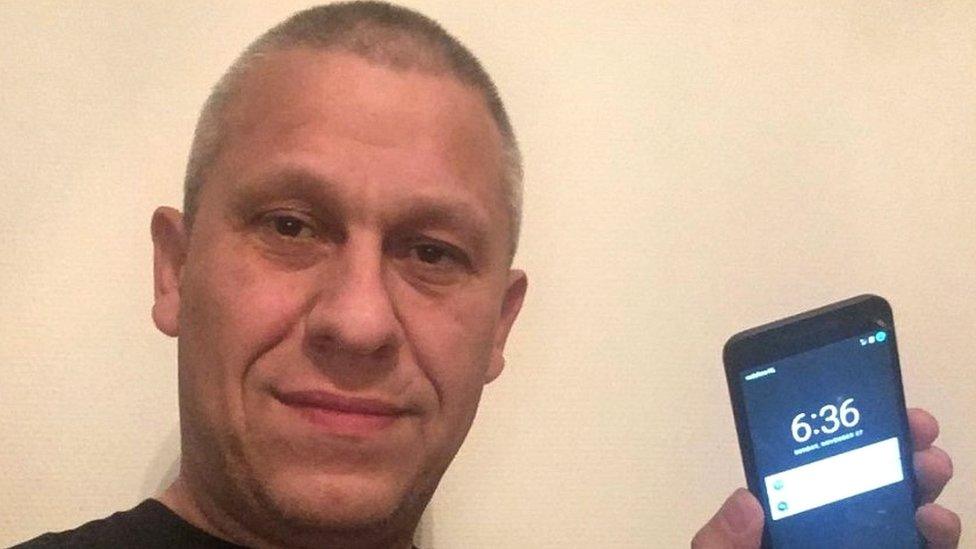
Martin Kok died outside a club near Amsterdam in 2016
It was investigated as part of Police Scotland's Operation Escalade.
Sentencing Hughes at the High Court in Stirling the judge, Lady Scott, said the murder was a ruthless "execution."
Kok was a convicted killer, turned crime writer, who had set up a website detailing the activities of criminals in his homeland.
During the trial it emerged Hughes met him at an Amsterdam hotel, then the Boccaccio sex club and alerted others to where he was.
When the pair left the club Hughes paused to stroke a cat, before Kok was gunned down as a "favour" for seemingly angering Moroccan gangsters.
Hughes was quizzed by Dutch police the next day, but was allowed to leave as the international probe into the shooting continued.
It was his apparent confession to a fellow gang member-turned-informer which lead to his downfall.
Hughes was arrested at a hotel in Turin, Italy in January 2020 and flown back to Scotland on a European Arrest Warrant.
The court heard Hughes was a trusted member of heavily-armed group, which was part of a vast criminal network.
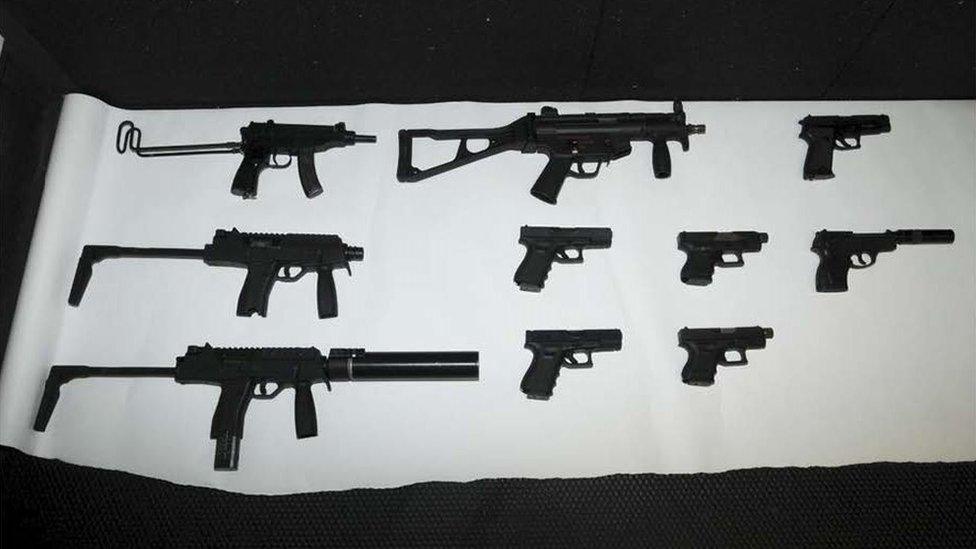
Firearms traded by the organised gang were also used to enforce the gang's lucrative drugs operations
It had links with gangs across the globe, from Colombian drug cartels to the Italian mafia.
The group even invested in state-of-the-art surveillance equipment in a bid to establish if their network had been compromised by the authorities.
During the trial at the High Court in Glasgow jurors were shown a photo of Hughes smiling with the two wanted men who run the operation.
They cannot be identified for legal reasons.
Hughes was listed by HMRC as "unemployed" but "wages" of £40,000-a-week earned him a luxury lifestyle in the Algarve.
The informer explained to jurors in evidence that he was told to set a meeting up in an Amsterdam hotel between Hughes and Kok.
He told the court he believed the meeting was to discuss advertising for the firm's encrypted phone company MPC, which was funded with £1m of dirty money, on Kok's new crime TV show.
The murder was originally due to happen outside the Citizen M Hotel in Amsterdam.
But 11 months later, during a "play by play" of events at his flat in Antwerp, Belgium, Hughes told the informant that the gun had jammed and a second attempt was made later on the same day.
Hours later, the court heard, Hughes paid for Kok's evening at the sex club and supplied him with cocaine.
The informant stated that he was speaking to his crime boss on the night of the incident.
"He [the boss] had been on about someone waiting for Martin Kok and Christopher Hughes was to hold back," he said.
"Martin left just ahead of Chris and he made a comment about a cat appearing at the club and that he stepped back to pet it."
Prosecutor Liam Ewing QC asked what the significance of petting the cat was.
The witness replied: "Martin was going to his car first so there was no mistake of anyone being caught in the crossfire."
Moroccan crime group
Jurors watched CCTV of Hughes moments after the shooting walking away from the scene texting on a mobile phone.
Mr Ewing also asked the informer if Hughes understood something was to happen to Kok that night.
He replied: "I remember a comment being made about putting him [Kok] on a plate for the Roccies."
The witness claimed he had a meeting with his boss a month after the murder.
He said: "I was told it was an arrangement because the lad had access to Martin with a group called the Roccies, a Moroccan crime group, who are all over but more prominent in Amsterdam."
Hughes' boss then organised for him to be picked up as he hid in bushes while paramedics arrived at the scene.
The court heard Hughes was later put under surveillance by police and watched as he visited industrial units in Cambuslang and East Kilbride, South Lanarkshire as well as Chapelhall, North Lanarkshire.
Mr Ewing told the jury in his closing speech that £700,000 was recovered from a machine inside one of the lock up garages.
He added the lock-up in Chapelhall contained £40,000 of anti-surveillance equipment which is normally only found in the hands of government organisations.
Police Scotland last month thanked law enforcement colleagues in the Netherlands and Italy for helping to bring the killer to justice.
Det Chief Supt Stuart Houston, head of the organised crime unit, said: "It has been well-documented that Hughes is a dangerous individual with a long association with organised crime in Scotland and beyond.
"He has wreaked havoc in our communities by trading illegal drugs to our communities and being involved in the importation of firearms which undoubtedly would have been used to harm or kill others."

Operation Escalade
A global investigation designed to dismantle Scotland's most sophisticated crime group has now resulted in 14 convictions.
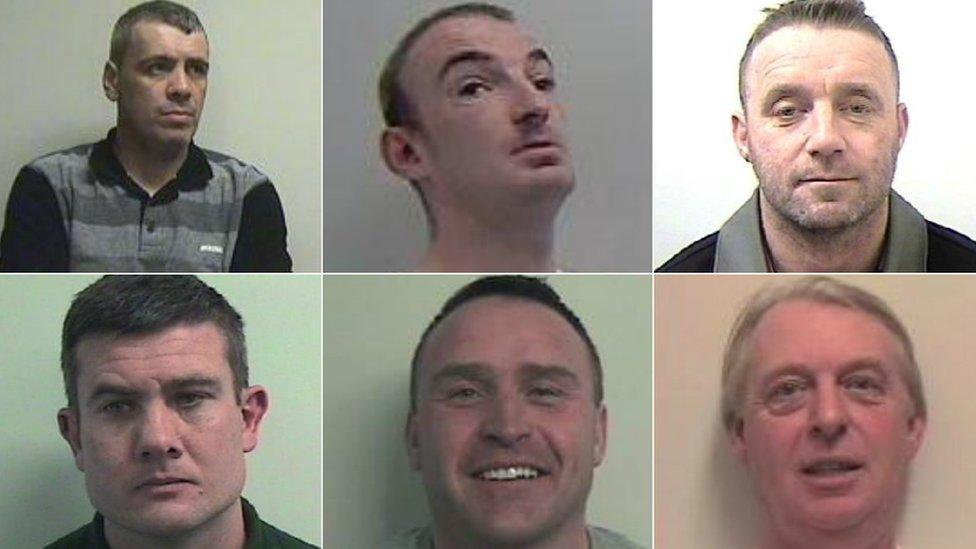
Clockwise from top left: Gerard Docherty, Steven McCardle, Francis Mulligan, David Sell, Barry O'Neill and Martyn Fitzsimmons.
January 2018: A nine-man gang was jailed for a total of 87 years after a massive investigation into violence, drugs and firearms offences.
They included cocaine dealer Mark Richardson and soldier turned gun-runner Martyn Fitzsimmons.
The list of crimes included the "merciless" torture of a man over an unpaid drug debt and a huge arsenal of weapons found hidden in a car.
Judge Lord Beckett said police had shown "extraordinary ingenuity, courage and commitment" to bring the gang to justice.
April 2019: Daniel Lindsay and Darren Mulheron were both jailed for seven years after after officers seized £3.4m of heroin and cocaine as well as five Glock handguns.
The pair from Castlemilk, Glasgow, pleaded guilty to being involved in serious organised crime.
Lindsay, 49, also admitted being concerned in the supply of heroin and Mulheron, 36, to being involved in the supply of cocaine.
Five months after his conviction Lindsay was ordered to hand over £600,000 following a proceeds of crime action
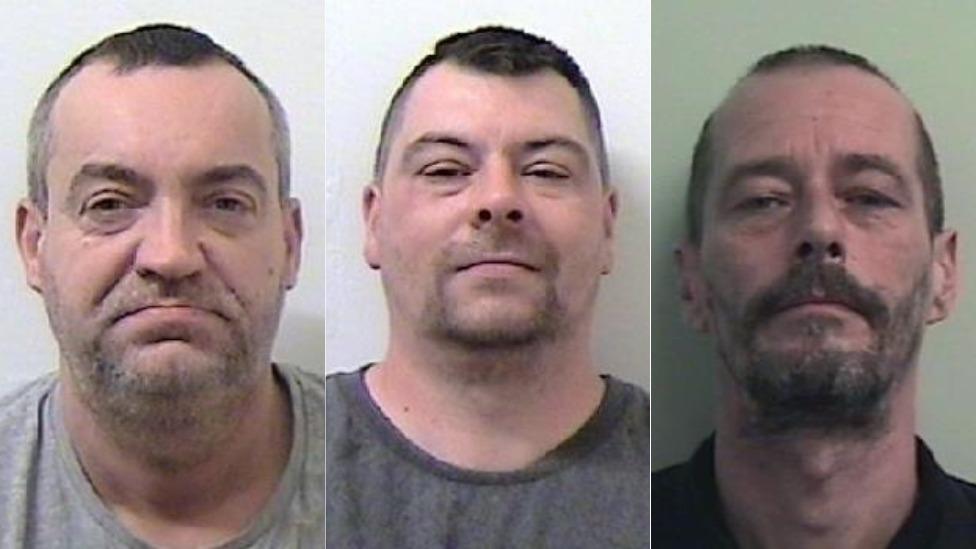
(Left to right) Joseph Lindsay's uncle Daniel Lindsay, Darren Mulheron and Paul Scott have also been convicted following two separate trials linked to Operation Escalade
April 2019: The group's technical expert Paul Scott fled overseas after being charged over his role with the gang.
The 47-year-old electrician, of Rutherglen, South Lanarkshire, eluded police for two years before being caught in Madrid in November 2018.
He was jailed for seven years after he admitted being involved in serious organised crime.
The court heard his role involved counter surveillance equipment as well as encrypted devices in order to stay ahead of police.
August 2019: Joseph Lindsay was caught after he left DNA traces on elastic bands used to bundle up money found hidden in a lorry.
Lindsay, 34, of Blantyre, South Lanarkshire, was brought back to Scotland to face justice after he was traced by Spanish police as he waited to meet his family at Tenerife South Airport.
The nephew of gang member Daniel Lindsay was jailed for four-and-a-half years after he admitted agreeing with others to conceal and disguise criminal property.
Last year Lindsay - a nephew of gang member Daniel Lindsay - agreed to hand over more than £100,000 to settle a proceeds of crime action.

Related topics
- Published30 March 2022

- Published22 February 2022
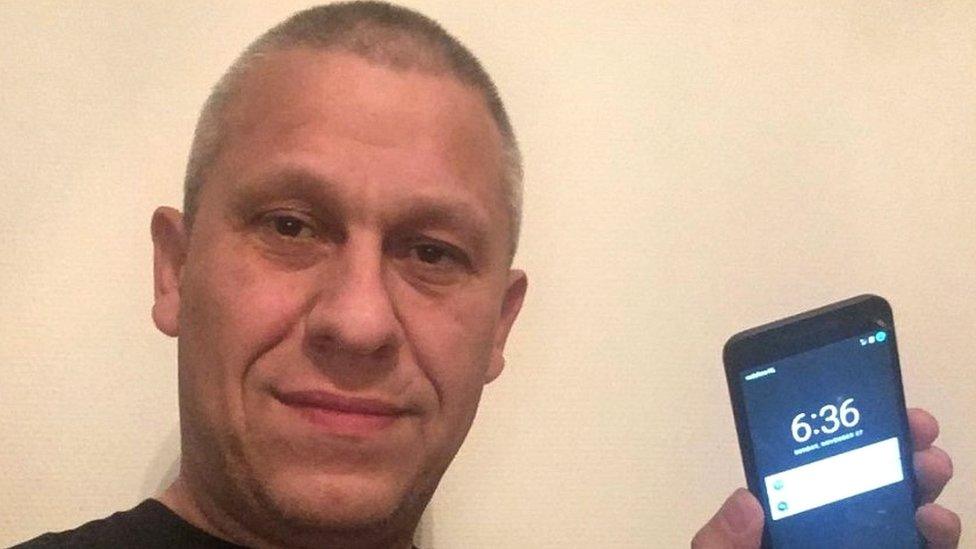
- Published21 February 2022
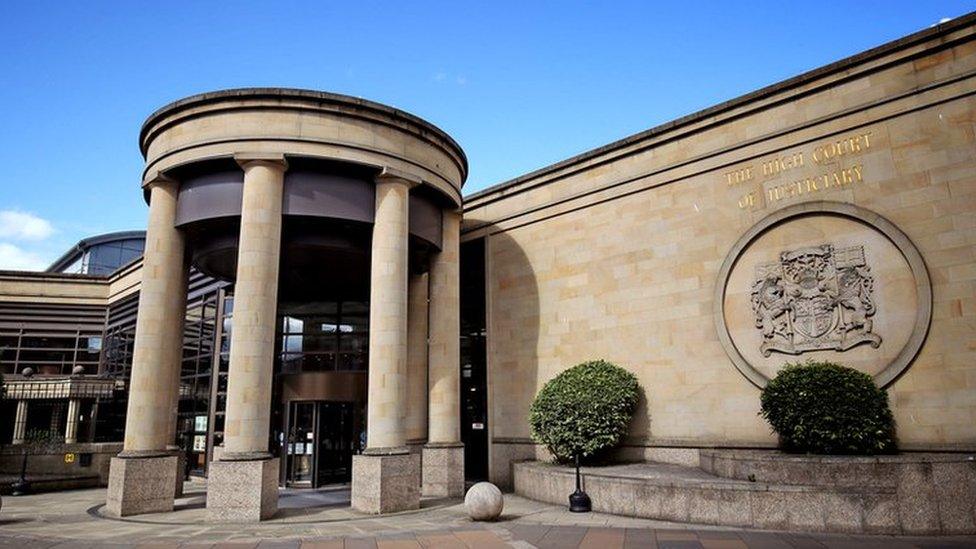
- Published2 August 2019
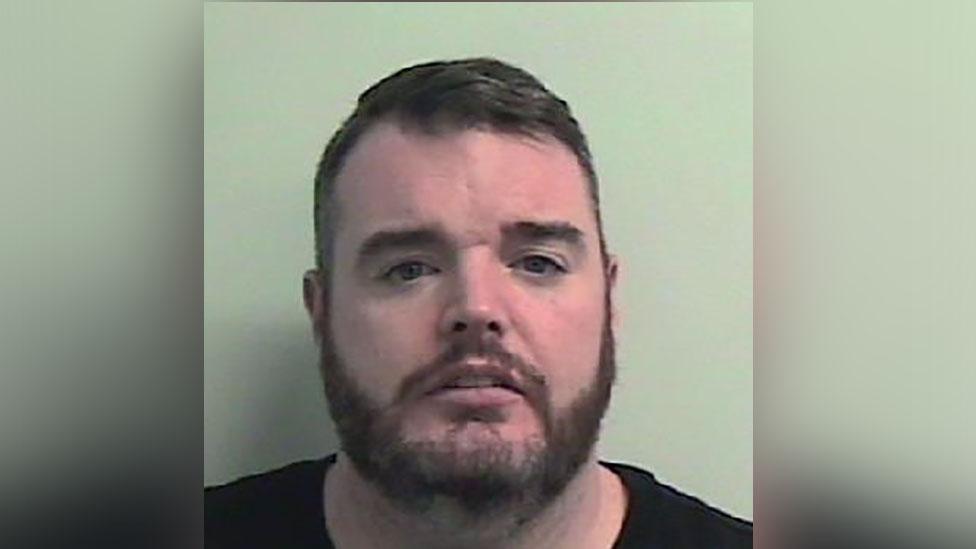
- Published26 April 2019
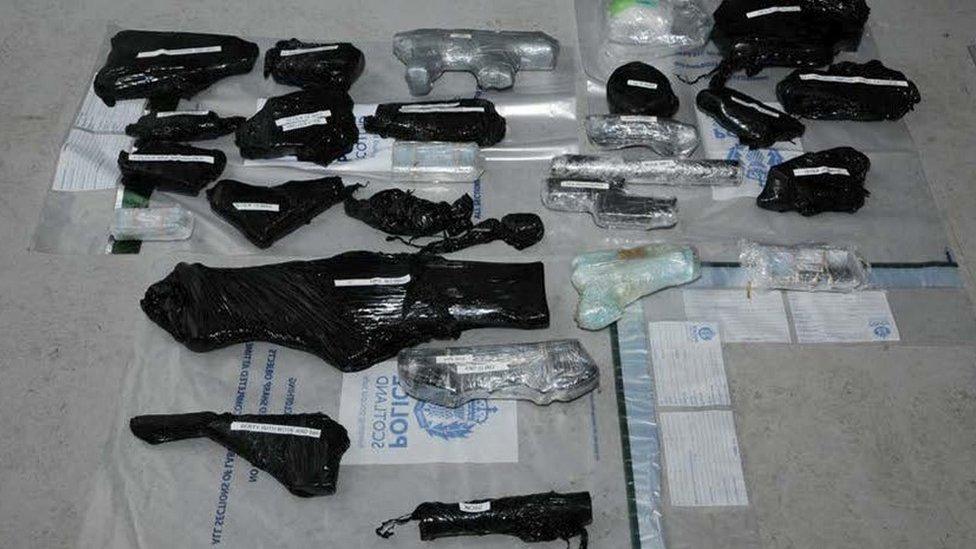
- Published22 January 2018
